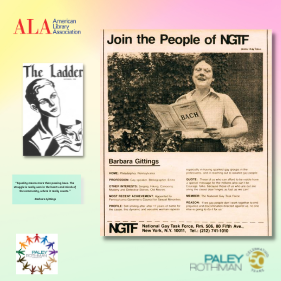Barbara Gittings: From The Ladder to the Lines

Barbara Gittings was a prominent early activist for LGBT equality in the U.S. Born in 1932, she lived an authentic life and used her voice to speak out when few were doing so. As she put it, her mission was to tear away the "shroud of invisibility" related to homosexuality, which had been associated with crime and mental illness.
Gittings organized the New York chapter of the first public lesbian organization beginning in 1958, and was the editor of its national publication, The Ladder, from 1963 to 1966. She also worked closely with Frank Kameny in the 1960s on the first picket lines at the White House, the U.S. State Department, and Independence Hall in Philadelphia to protest the ban on employment of gay people by the U.S. government.
Gittings remembered, "It was risky and we were scared. Picketing was not a popular tactic at the time. And our cause seemed outlandish even to most gay people." Before the protests at the State Department, Secretary of State Dean Rusk discussed the pickets at a press conference, which high-profile visibility Gittings viewed as a "breakthrough into mainstream publicity." From 1965 to 1969, together with Frank Kameny, she led the “Annual Reminder,” where activists picketed at Independence Hall on July 4th. After the Stonewall Riots in 1969, the annual Gay Pride Parade commemorating the riots took the place of the “Annual Reminder.”
Though not attorneys, Gittings and Kameny worked together to cross-examine and discredit an expert witness in hearings held by the US Department of Defense. The government’s expert testified that homosexuals could be converted to heterosexuality and defended the policy that homosexual employees could be fired for being named as homosexuals. Following their cross-examination, the Department of Defense dropped the expert from its list of witnesses. "Publicity was the objective," Gittings recalled many years later.
Gittings spoke at hundreds of events in the late 1960s while discrediting the notion that homosexuality was an illness. In a letter from that time, she said:
I keep trying to convince people in the movement that the charge of sickness is perhaps our greatest problem ... we can't really progress in other directions until the unsubstantiated assumption of sickness...is demolished! It's almost always there, however slyly or covertly or even unconsciously, however 'sympathetic' the person: the attitude that homosexuality is somehow undesirable, some sort of twist or malfunction or failure or maladaptation or other kind of psychic sickness. And in our society sick people, by any definition of sick, just DO not get equal treatment. Equal treatment — no more, no less — is what we want! And compassion — which many homosexuals gladly swallow because they think it represents an improvement in attitudes toward them — is not equal treatment.
This mission culminated in Gittings advancing the movement to get the American Psychiatric Association to drop homosexuality as a mental illness in 1972.
Her early experiences with trying to learn more about lesbianism revealed that little to no literature existed about homosexuality beyond the psychological journals condemning it. This fueled her lifetime work to ensure that libraries offered positive literature about homosexuality. Through her involvement in the American Library Association (ALA), especially its gay caucus, Gittings so advanced this cause that she was awarded a lifetime membership in the ALA, which named an annual award for the best gay or lesbian novel the Barbara Gittings Award.
In the early 1970’s, she was one of the first openly lesbian women to appear on television in the U.S., where she told David Suskind, "Homosexuals today are taking it for granted that their homosexuality is not at all something dreadful – it's good, it's right, it's natural, it's moral, and this is the way they are going to be!" Her message and legacy still reverberate today.
